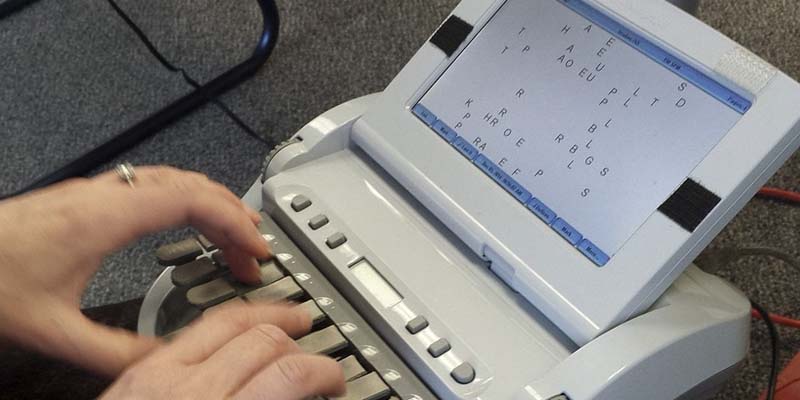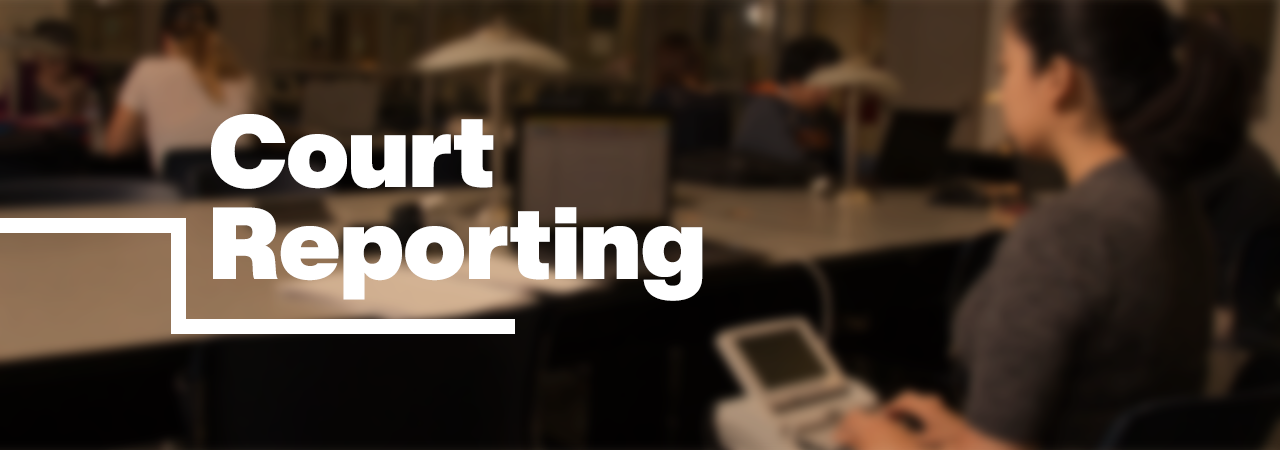Everything About Court Reporting: Crucial Insights Into Its Importance in Law
Court reporting offers an essential feature within the legal framework, supplying a accurate and trusted record of process. Through innovative methods and devices, stenotype reporter catch the subtleties of testimonies and legal discussion. The significance of their work expands beyond simple transcription. As the lawful landscape develops, so also does the role of innovation in court reporting. Recognizing these dynamics exposes much deeper ramifications for justice and openness in the legal system.
The Role of Court Reporters in the Legal System

Although typically forgotten, stenotype reporter play a necessary role in the legal system by making sure a verbatim and exact record of procedures. Their key responsibility includes recording spoken words during trials, depositions, and other legal occasions, which offers as a main document for future recommendation. This paperwork is crucial for charms, as it provides the necessary information for reviewing choices made by discretionary.
Court press reporters should have remarkable paying attention abilities and a deep understanding of lawful terms to capture the nuances of testimony and argumentation accurately. Their job adds to transparency within the judicial process, allowing for accountability and justness. Furthermore, they help with access to justice by making documents offered to included parties, guaranteeing that everyone has the possibility to examine the proceedings. In this means, stenotype reporter maintain the integrity of the lawful system, strengthening the importance of exact communication in matters of regulation.
Methods and Devices Utilized in Court Reporting
In court reporting, various strategies and tools boost the accuracy and performance of transcription. Stenography innovation plays a substantial function, allowing press reporters to capture talked words promptly, while electronic recording approaches supply alternative remedies for documentation. Recognizing these tools is important for realizing how stenotype reporter satisfy their essential feature in the legal system.
Stenography Innovation Overview
Stenography innovation offers as the cornerstone of contemporary court reporting, making it possible for efficient and exact transcription of talked discussion. Utilizing specialized equipments known as stenographs, court reporters can record speech at remarkable speeds, commonly going beyond 200 words per minute. These makers use an unique keyboard design that enables numerous keys to be pressed all at once, creating phonetic representations of words - durham court reporting. This method reduces the requirement for considerable punctuation and boosts transcription accuracy. Additionally, stenographers utilize various shorthand techniques and icons to further enhance the procedure, guaranteeing that no information is forgotten throughout process. The assimilation of stenography technology not only promotes effective communication in legal settings yet additionally maintains the integrity of the judicial process by offering trustworthy and accurate documents of conversations
Digital Recording Approaches
A boosting variety of court reporting specialists are turning to digital recording methods to enhance the accuracy and performance of their transcriptions. These strategies use sophisticated audio and video innovation to catch proceedings in real-time. Digital recorders, frequently combined with top notch microphones, ensure that every word talked is maintained with quality. Specialized software program can transcribe audio files instantly, enabling for quicker turnaround times. Some specialists integrate dual recording systems for redundancy, assuring no important information is shed. Furthermore, electronic recordings can be easily indexed and looked, assisting in swift access of particular sections. As lawful atmospheres evolve, accepting these electronic tools not only streamlines the reporting process yet likewise keeps the stability of the document.
The Relevance of Accuracy in Transcription
Precision in transcription is important in court reporting, as it assures that legal records mirror the real content of process. This precision can considerably affect case results, impacting the choices made by discretionary. Maintaining high requirements of precision is critical in the lawful career.

Precision in Legal Records
The legal system depends greatly on eloquent disagreements and influential rhetoric, the true foundation of judicial procedures lies in the accuracy of lawful documents. Accurate transcription is important, as it guarantees that every judgment, inquiry, and declaration is recorded correctly. Such accuracy offers numerous objectives, consisting of providing a trusted reference for charm processes and preserving the stability of the judicial system. Errors in transcription can result in misunderstandings, false impressions, and possibly detrimental consequences for all events involved. Subsequently, stenotype reporter have to have extraordinary skills and interest to detail, as their work straight affects the quality of lawful papers. Eventually, the precision of lawful records underpins the trust fund placed in the judicial process, strengthening the significance of precise transcription.

Influence On Instance Outcomes
When legal proceedings unfold, the accuracy of transcription commonly dictates the trajectory of a case's end result. Accurate court reporting assurances that every word spoken is effectively recorded, enabling courts, judges, and lawyers to make informed choices based on the document. Errors in transcription can lead to misconceptions, false impressions, and possibly unjust judgments. The stability of lawful papers relies heavily on the precision of these records, as they function as the foundation for allures and further lawful actions. In high-stakes cases, where the implications are profound, the duty of a stenotype reporter comes to be much more essential. Preserving rigorous requirements in transcription not just supports the legal procedure yet also supports the concepts of justice and justness in the courtroom.
Court Reporting in Various Lawful Setups
Court reporting plays a necessary role throughout numerous legal setups, Full Report ensuring that process are precisely recorded for future reference. In criminal court, court press reporters record testimonies, evidence, and judicial judgments, which are vital for appeals and case evaluations. In civil lawsuits, precise transcripts assist in the exploration process and offer a reliable record for test proceedings. Management hearings frequently depend on court press reporters to maintain an official record, ensuring openness and accountability in governmental procedures. Family courts also benefit from court reporting, as exact documents of process can affect safekeeping decisions and settlements. Additionally, depositions in pre-trial phases need accurate recordings to catch the nuances of witness testimonies, which might be substantial fit case techniques. In general, court reporting functions as a keystone in the lawful system, promoting fairness Our site and quality across varied judicial settings.
The Effect of Technology on Court Reporting
As modern technology remains to progress, its impact on court reporting has actually come to be progressively considerable. Advancements such as digital recording, real-time transcription software application, and fabricated intelligence have actually changed standard methods. Digital audio recorders now capture courtroom procedures with remarkable quality, enabling court reporters to concentrate on nuances and context as opposed to entirely on typing. Real-time transcription modern technologies enable prompt access to records, promoting effectiveness and boosting partnership amongst lawyers. Furthermore, fabricated intelligence devices are being integrated to help in the transcription process, reducing human mistake and expediting paper generation. Despite these innovations, the vital abilities of court reporters continue to be important, as they give a nuanced understanding of lawful language and courtroom characteristics. Inevitably, technology matches instead of replaces the experience of stenotype reporter, guaranteeing that the stability and precision of lawful documentation are maintained in a significantly digital landscape.
Job Opportunities and Pathways in Court Reporting
The development of innovation in court reporting has actually opened a variety of profession chances for aiming experts in the field. Generally, court reporters were mostly in charge of recording legal proceedings. Improvements such as digital recording and real-time reporting have broadened their functions.
Today, stenotype reporter can focus on locations such as captioning for transmission, giving transcription solutions for lawful firms, and operating in the business market for conferences or depositions - durham court reporting. Furthermore, chances in remote reporting, especially due to the rise of virtual courtrooms, have come to be significantly widespread
Educational paths include formal training programs, accreditation programs, and continuing education and learning to remain updated with technological changes. Networking within specialist and lawful organizations also plays a significant duty in occupation innovation. On the whole, the varied chances in court reporting reflect the vibrant nature of the legal profession and the raising need for knowledgeable experts.
The Future of Court Reporting in an Evolving Legal Landscape
Exactly how will the role useful site of court reporting adjust as the legal landscape remains to develop? As technology advances, court reporting is most likely to embrace cutting-edge tools such as artificial knowledge and real-time transcription software. These innovations might enhance accuracy and efficiency in catching lawful procedures. Moreover, the increasing prevalence of remote hearings demands that court press reporters become adept in digital platforms, guaranteeing smooth documents no matter location.
All at once, stenotype reporter will require to adjust their abilities to manage new sorts of instances, such as those involving cyber legislation and copyright disagreements, which require specialized expertise. Additionally, the demand for immediate accessibility to records will certainly press experts to provide quicker turn-around times without compromising quality. Inevitably, the future of court reporting will certainly pivot on an equilibrium in between conventional skills and technological combination, guaranteeing that the honesty of the lawful procedure continues to be undamaged in an increasingly digital world.
Frequently Asked Concerns
Exactly How Do Stenotype Reporter Take Care Of Delicate Information During Procedures?

What Qualifications Are Required to Come To Be a Stenotype Reporter?
To become a stenotype reporter, people usually need a senior high school diploma, specialized training from a certified program, effectiveness in shorthand or voice writing, and certification or licensure, depending on state requirements and laws.
Are Court Reporters Required to Have a Permit?
Court reporters are frequently called for to obtain a certificate, depending upon the territory. Licensing assurances that they meet details requirements of proficiency and professionalism and trust, which is important for keeping the stability of lawful procedures.
Just How Do Court Reporters Take Care Of Different Accents and Dialects?
Stenotype reporter manage various accents and dialects with extensive training, method, and familiarity with different speech patterns. They often utilize specialized software and methods to properly capture talked words, ensuring clearness and accuracy in their transcripts.
What Is the Typical Wage for a Court Reporter?
The typical wage for a court reporter varies by place and experience, generally varying from $50,000 to $80,000 annually. In high-demand areas, incomes can surpass $100,000, reflecting the occupation's relevance and specialized abilities.
Frequently ignored, court press reporters play an important function in the lawful system by ensuring a accurate and verbatim document of process. In criminal court, court press reporters transcribe testimonies, evidence, and judicial rulings, which are vital for allures and instance reviews. Family courts likewise profit from court reporting, as exact documents of process can affect protection decisions and negotiations. Generally, court reporters were largely accountable for recording lawful proceedings. Today, court reporters can specialize in locations such as captioning for tv programs, providing transcription services for lawful companies, and functioning in the corporate sector for depositions or meetings.